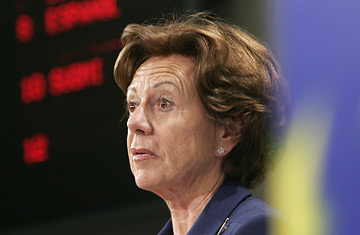
Neelie Kroes pushed to investigate the European pharmaceutical market.
The announcement of a "dawn raid" — the police swooping on the unsuspecting targets — might have conjured images from the Chicago of Al Capone and Eliot Ness, or from an episode of Miami Vice.
However, these targets were not backstreet bootleggers, but rather the headquarters to some of the biggest companies in the world: pharmaceutical giants like U.S.-based Pfizer, Britain's GlaxoSmithKline and Sanofi-Aventis of France. And the police were no gunslinging sheriffs, but bureaucrats from the European Commission, seizing computer files and documents. Welcome to the world of market regulation, and to the Commission's intrepid strike force of dawn raiders.
The raids, early on Wednesday, were launched from Brussels to investigate whether big drug companies were fixing the market to squeeze out copycat medicines. They included forays on Pfizer, Merck, Bayer Schering Pharma and Roche as well as generic firms such as Teva and Sandoz. Hours later, with almost ironic understatement, the E.U. competition watchdog said it had merely launched a "sector inquiry into pharmaceuticals with unannounced inspections."
E.U. Competition Commissioner Neelie Kroes said she wanted to see if drug companies were holding up the release of cheaper generic copies of their brand-name drugs when patents expire. She also said she was concerned that pharmaceutical companies may be colluding to cut deals that temporarily sideline generics in return for payoffs. With Europeans spending some €200 billion ($297 billion) a year on pharmaceutical products — an average €400 ($588) for every man, woman and child — Big Pharma has a huge interest ensuring that customers continue paying high prices for their drugs.
"Individuals and governments want a strong pharmaceuticals sector that delivers better products and value for money," Kroes said. "But if innovative products are not being produced, and cheaper generic alternatives to existing products are in some cases being delayed, then we need to find out why and, if necessary, take action."
Kroes admitted that there was no direct evidence of wrongdoing, but she suspected some problems. According to industry figures, the number of novel medicines reaching the market has tumbled over time, from an annual average of 40 between 1995 and 1999, to 28 between 2000 and 2004. "Patent protection has never been stronger, but the number of new pharmaceuticals coming to market is declining," she said. "Without new pharmaceuticals, the quality of some medical treatments will stagnate; without generic products, the cost of some medical treatments will remain high."
The investigation will look at issues like the use of intellectual-property rights, litigation and settlement agreements covering the E.U. — all subjects that companies tend to consider highly confidential and might easily withhold, conceal or destroy, Kroes said.
Kroes said the probe was partly triggered by her 2005 fine on AstraZeneca of €60 million ($88m) after the Commission found the company had delayed market entry of a rival ulcer drug by misleading authorities over the expiration of its patent.
For some, the idea of Brussels steaming into corporate premises is shocking. But the Commission's competition services have wide powers to raid businesses suspected of organizing cartels or other illegal E.U.-wide activities.
Kroes has begun probes over the past couple of years into the telecommunications, electricity, gas and financial services. But this is the first time she has kicked off a fact-finding exercise with a coordinated series of raids. The inquiry could lead to companies being fined up to 10% of their turnover or taken to court. In the past year alone, it has imposed fines of over €3 billion ($4.5 billion) on firms such as Microsoft that had broken competition law.
Unlike in cartel cases, the drug sector raids were prompted by a general sense that the E.U. market is not working rather than by specific indications of illegal activity. That itself is an indication that the Commission is taking an ever bolder role in regulation, and is not afraid to go up against some of the biggest beasts in the corporate world.
